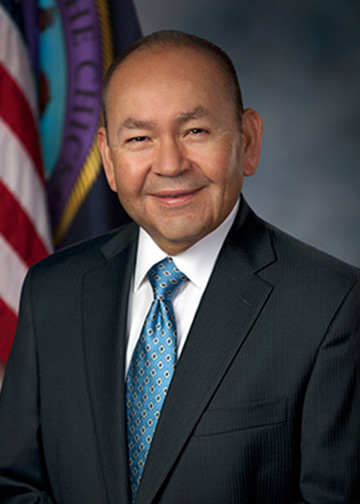
Governor Bill Anoatubby
Our Chickasaw Nation story is a story of solidarity and victory
By Bill Anoatubby, Governor, Chickasaw Nation
It has been almost seven generations since the Chickasaw people were removed from their ancestral Southeastern homelands.
That represents about two centuries of challenge, innovation, perseverance and, ultimately, triumph.
Throughout the 1600s, 1700s and into the 19th century, the Chickasaw Nation continued to adapt to changes in its environment. There were conflicts with other tribes, European contact and a rapidly changing world that continued to present new challenges.
By the 1830s, the Chickasaw Nation was forced to relinquish its homelands. To the credit of our tribal leaders, the Chickasaw Nation negotiated a better settlement than other tribes. Removal was a painful, unsettling, and sometimes lethal experience. We persevered, however, with great strength and dignity.
Chickasaws were obviously concerned for their future. Most importantly, they were united in spirit to the sovereignty of the Chickasaw Nation and the continuity of their Chickasaw government. In 1856 the Chickasaw Nation established its constitution and went about the effort of reforming its government.
Near the end of the 19th century, we experienced allotment of our lands. Some allotment proponents had good intentions and believed they were doing the right thing for Indian people. But there were plenty of others who simply looked forward to grabbing land, minerals and property.
Once allotment had occurred, the Chickasaw people entered a time of great challenge. Our culture and history were greatly mis- understood. Chickasaw people endured decades of hardship. Federal Indian policy was difficult to predict and swung from one extreme to the other. Things were not good. Chickasaw families persevered, suffered and survived.
All tribes went through another attempted termination period during the 1950s. Like the ocean pounding against the sea wall, it seemed it would never end.
However, the 1960s finally ushered in some welcome change. Some American leaders began to actually understand Indian sovereignty and considered it when making policy. Our tribe began to find its way forward once again.
President Nixon understood the importance of tribal sovereignty and self-determination. He understood tribes could manage their own affairs and care for their own people. Our tribal sovereignty, which had always been our bedrock, was now recognized as the vehicle by which Indian tribes could be responsible for their own people and their own success.
The Chickasaw people had endured times of tremendous challenge. So many times, the easy thing to do would have been for the Chickasaw people and the Chickasaw Nation to simply give up the fight. But we did not disband, and we did not forget the generations before us who had built our tribal foundation and our government.
We have reformed our government and constitution, focused on serving Chickasaw people and doing the right things as a government should.
Our togetherness, our dedication and our passion have been rewarded. The Chickasaw Nation is now arguably one of the strongest and most successful tribes in the country.
It has been a long road, but that long road has led us to success. Our story never grows old. It is a story of love and commitment to one another through all the hard times. Itis a story of solidarity, and victory.